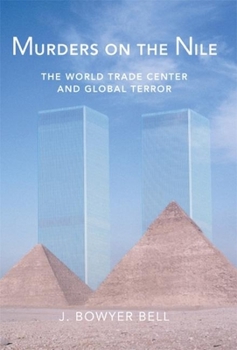Murders on the Nile, the World Trade Center and Global Terror
Select Format
Select Condition 
Book Overview
In Murder on the Nile, the World Trade Center and Global Terror, J. Bowyer Bell takes us back to the cradle of Islamic discontent, showing how Islamic terror arose along the banks of the Nile a century ago amidst the grievances of an Egypt held in bondage by foreign imperialists and local despots. Two generations of clerics, sheiks and imams, became obsessed with the luminous appeal of the absolute. And the most zealous of these lethal idealists found in righteous murder -- a holy war -- a proper means to shape an ideal Islamic society free from the contaminating influence of Westernization. Believing that they possess the absolute truth, they were willing to deploy terror to bring this truth to pass. They murdered British soldiers and local politicians, eventually tried to murder Nasser and murdered Sadat. Bell shows how this movement which originated in Egypt spread to the rest of the Islamic world which also became converted to the notion of redemption through jihad. Egyptian exiles, dispossessed Palestinians, Afghan Arabs created an underground world filled with dreams of violence, freedom, and vengeance as a way of returning to the paradise of an imagined past. By the end of the century, these zealots had filled their ranks with idealists and bigots, hijackers and holy men, charismatic leaders and men on the street. In describing this genealogy of terror, Bell shows how what began almost one hundred years ago along the Nile gradually became a global conspiracy found not only along the Nile but ultimately along the Hudson as well. After reading Murder on the Nile we understand that the righteous terrorists whose movement began a century ago in Egypt are the voice of the past, powerful and evocative, but not necessarily the sound of the future if we force ourselves to understand and cope with their world and worldview.
Format:Hardcover
Language:English
ISBN:1893554635
ISBN13:9781893554634
Release Date:February 2003
Publisher:Encounter Books
Length:224 Pages
Weight:1.05 lbs.
Dimensions:0.9" x 6.3" x 9.3"
Customer Reviews
2 ratings
This guy has seen it all
Published by Thriftbooks.com User , 18 years ago
Bell was a social scientist who stumbled into the study of terrorism early by being in accidently place early in the latest cycle of the Irish Troubles. He has studied, in his phrase, "talked up", one man's freedom fighter or another man's terrorist from the members of the Irgun to the Provos, including a few junkets to Beruit during the Israeli occupation. He saw the cross-fertilization of techniques as each of these groups studied the other. As fate would have it he was writing of the original Trade Center bombing when the airliners hit the wall. The one slim volume ties the latest wave of Middle Eastern terrorism together in a taut narrative. (I say latest because the West has been taking casualties in these conflicts since the 60's) His narrative of John O'Neill, fittingly the person Clarke dedicated his book to and a 9/11 casualty, is the worm's eye view on how a ragtag band of Arab exiles living in mud huts in the dying embers of the Cold War sucker-punched the Cray-driven intelligence apparatus of the West. Sadly, this work was Bell's last. He is missed.
the beginnings of Islamoterror
Published by Thriftbooks.com User , 22 years ago
Here's a book that shows where all this terrorism began. It was in Egypt, not Palestine or Lebanon or any of the other hotspots you might expect. Trying to get rid of the Brits, the Egypstians pioneered "righteous murder"--assasination with a theological justification. The author shows that it was different from any of the terror yet practiced by anarchists in Russia and elsewhere, and what developed from it was different from anything practiced later by groups like the IRA and the Red Brigades. There is a scary portrait here of Sheikh Abdel Rahman, who brought Islamist terror to the U.S. in 1993 with the first bombing (these guys were obsessed with the symbolism) of the World Trade Center. This book is must reading for anyone who wants to know how jihadi terror began and where it might go.





